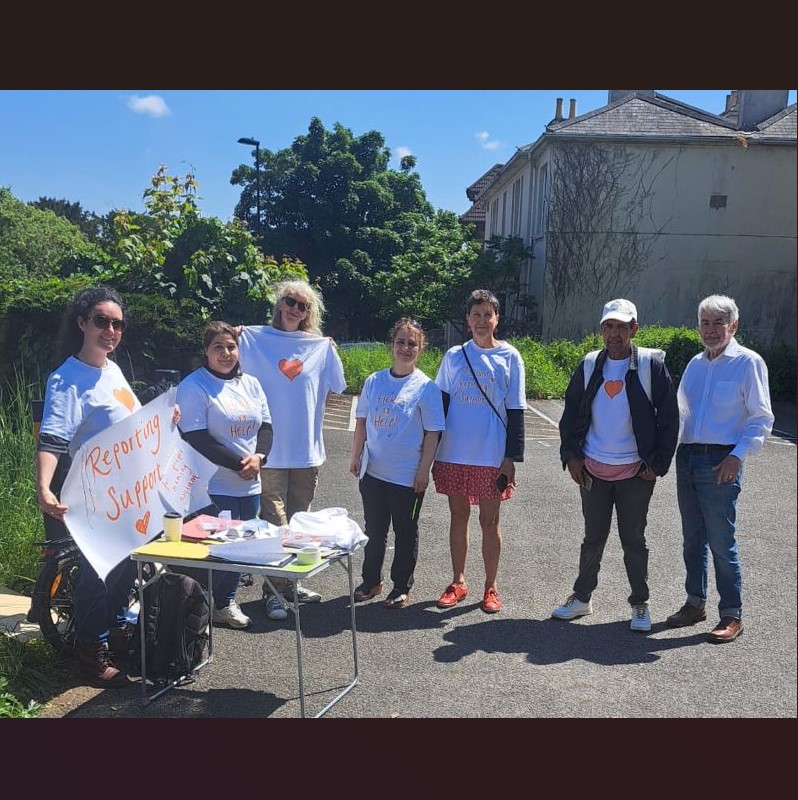By Manthan Pathak.
It’s a Monday morning like any other for most of us, but not for everyone. Outside Portswood police station dozens of men and women seeking refuge queue to ‘report’, a regular commitment they must make if they have claimed asylum. For many, they know that every reporting visit carries the risk of being detained for an indefinite amount of time.
Since the government’s Rwanda plan came into force, that risk has been transformed into something even more terrifying — the unveiled threat that they not only will they be sent to a detention centre, but deported to a country known for its human rights abuses.
The Rwanda Act is the final expression of the Hostile Environment policy that started, as many things do, as simply words on a page. Language matters though. Theresa May’s delivery of those words at the Tory conference in 2012 marked a lurch to the political right that has accelerated to its most dehumanising end point.
The Act targets anyone who has claimed asylum after January 1st 2022 and travelled to the UK irregularly or has their claim refused. We know that asylum seekers risk their lives to take these perilous journeys here out of desperation to urgently escape traumatic situations at home; that there are a limited number of safe legal routes; and that there are no other options available to them. A report by the Refugee Council highlighted the Home Office’s own statistics that three in every four people who crossed the channel in 2023 would be recognised as refugees if their claims were processed.
At the reporting centre in Portswood there is palpable anxiety as people prepare to enter the building, heightened by an awareness that detention vans are parked behind the station. Their presence means that some of those who enter are certain to be detained, handcuffed and taken away. A group of us hand out bustcards with free phone numbers for legal support in case of detention and record the names of those who enter and leave to try and ensure no one is unaccounted for.
We’re a collection of volunteers from Stand Up to Racism, Southampton & Winchester Visitors Group, Southampton Action, Food Not Bombs and others who have come together in resistance to the brutality of the Rwanda Act. The only possible antidote for brutality is compassion, so while we can’t physically block a detention vehicle leaving, we can offer them advice on what to do if they are detained before they enter, and we try to reach as many as we can. Most of all we want to provide the assurance that someone is looking out for them, that someone cares.
Rishi Sunak has called a snap general election for July 4th, and we know now that no flights to Rwanda carrying detainees will leave before that date, and some have been released from detention. The crisis is over for now. But with a Labour victory assured, we should pay attention to what history tells us about the role Blair’s government played in turning the trajectory against asylum seekers through successive legislation that made them political targets, predominantly through severely restricting their ability to appeal decisions and forced dispersal, a policy which led to estrangement for many from the asylum communities that had come to support them.
Whatever the outcome of the election, there will still be a high number of asylum seekers detained at Immigration Removal Centres, in conditions that have been the subject of numerous independent inquiries in recent years. Far from the secure and humane conditions that they are expected to provide, places like Brook House, Yarl’s Wood and Harmondsworth have been found to be home to degrading treatment, bullying and explicit racism. When you consider that some of the detained are victims of torture and people trafficking, the picture blackens. Mental health in these institutions is precarious — suicide attempts are a common occurrence.
And so back to the men and women lining up outside the police station in Portswood. The uncertainty of not knowing whether they will be able to leave freely or be detained and taken to one of those places must have been overwhelming, like entering the mouth of a shark, and yet it is a situation over which they have no control. And yet the gratitude I received from the asylum seekers I spoke to, amid such a worrying situation, says so much. These are people I’d want to be my neighbour, to be part of my community.
This government would erase their histories and discard their futures through legislation like the Illegal Immigration Act and the Safety of Rwanda Act to make real an environment that isn’t only hostile but can prove to be fatal. Our resistance to them is amplified by the passersby who show their support. It’s a comforting reminder that Southampton is a City of Sanctuary after all, where it’s possible to believe that those who come here seeking sanctuary are not criminals but citizens in waiting.
Refugee Week (June 17 to 23) is a celebration of the resilience and contributions of those who have sought sanctuary in our city, culminating in a parade and community picnic with music, dance and games for all on Saturday 22nd June. You can find out more information here.
- In Common is not for profit. We rely on donations from readers to keep the site running. Could you help to support us for as little as 25p a week? Please help us to carry on offering independent grass roots media. Visit: https://www.patreon.com/incommonsoton

